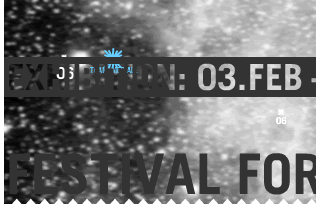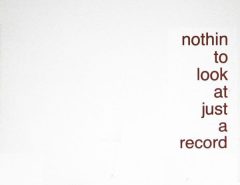transmediale.06
REALITY ADDICTS
Berlin, February 3 – 7, 2006
Akademie der Kuenste
Berlin, Hanseatenweg 10
Conference
The transmediale.06 conference runs under the title ‘Reality Addicts’ and deals
with artistic and social ideas that don’t stop at the borders of mediatised
reality. ‘Reality Addicts’ does not approach the relationship of media and
reality from the perspective of technologies that impose specific perceptions
or constructions of reality. Rather, within five panels and four lectures the
conference explores ways in which these constructions can be subverted,
exaggerated or reduced to absurdity. ‘Reality Addiction’ is a positive,
affirmative attitude towards reality, faithful to the power of humour as a form
of critique and social practice. Being addicted to reality means to long
ever-more for it, always contradictory to and inconsistent with what we already
know. The conference offers a reality-check of the present, taken from artistic,
cultural and socially committed perspectives.
In cooperation with the Federal Agency for Civic Education.
Humour Politics
Fri 3 Feb 2006, 14h
For artists, humour is one of the most important strategies to deal critically
with social and political issues and to explore the potentials of social
change. Parody, play and the carnivalesque are forms of criticism that both
artists and activists from political and social movements use in order to gain
the attention of the public. By means of humour they rebel against the limited
views of a realism whose only concern is functionality, not consequences. They
unmask the media’s fixation with the spectacular and protest against new
judicial and political restrictions, as well as against all attempts to limit
the freedom of expression. For the politically-committed arts, humour is a
means of survival.
with Anne-Marie Duguet, Gerald Raunig, Sebastian Luetgert
hosted by Brian Holmes
Dominique Noguez: ‘L’humour n’existe pas’
Fri 3 Feb 2006, 19h – 20h30
Dominique Noguez, French philosopher, author and essayist, is the most important
contemporary thinker concerned with humour as a concept and social practice. By
pointing out the boundaries of humour Noguez discusses the multiple nuances of
humour, its numerous forms of expression and its cultural and historical
significance.
Media Addicts I
Sat 4 Feb 2006, 12h
The panel ‘Media Addicts’ deals with the phenomena of a fully mediated world. It
discusses the technologies which permeate our existence and examines the
representation, perception and transformation of reality by media. Have we
arrived in the futurological scenarios and ‘science fiction’ of the 1980s? And
how are the subjective, social and political structures evolving that the
techno-utopians so often ignored, or painted in the rosiest of colours? This
first part of ‘Media Addicts’ (the second part follows the next day) places the
emphasis on the socio-political aspects of media technologies.
with Jordan Crandall, Simon Penny, Lu Jie
hosted by Matthew Fuller
Transgressions
Sat, 4 Feb 2006, 16h
Contemporary culture is characterised by the paradoxical juxtaposition of excess
and control. While the transgression of aesthetical and moral borders is
becoming as normal as the daily dose of shock and horror, we also learn to live
with increasingly rigid mechanisms of control and exclusion. This panel deals
with artistic and theoretical aspects of this antagonism between extreme
freedom and control. Are there any more ethical borders or walls against which
art can rebel? And how significant are the aesthetic strategies of
transgression within today’s reality?
with Shu Lea Cheang, Jens Hauser, Katrien Jacobs
hosted by Sigrid Schade
Gerburg Treusch-Dieter: ‘Mouthpiece-Pipe-Container. Effects and Defects of a Desiring Machine’
Sat 4 Feb 2006, 19h
Gerburg Treusch-Dieter has been dealing with the gender codes of human-machine
relations for many years. With a profound sense of humour and unrelenting
questions she approaches the phenomena of contemporary life as well as those of
historical mythologies, and connects and combines whatever belongs together. Her
talk is devoted to the vacuum cleaner whose multiple psychological layers are
exemplary for the way in which technologies and bodies are interconnected.
hosted by Marie-Luise Angerer
Media Addicts II
Sun 5 Feb 2006, 13h
Many people today surround themselves with a panoply of digital gadgets. Mobile
phones and MP3-players, GPS and navigation systems, as well as a multiplicity
of media channels for information and entertainment are part of their everyday
lives. Wavering between the terror of consumption and comprehensive
auto-surveillance, these ‘Media Addicts’ move through a world determined by
technologies, in which the borders between the individual, media prostheses and
the hybrid layers of cyberspace are blurred. How is our subjective perception of
these ‘augmented realities’ changed by mobile media, and what are the effects on
social cohesion and on the public sphere? Which desires and which necessities
drive us to enter these extended media realities?
with Michael Bull, Janet Cardiff, Marie-Luise Angerer
hosted by Matthew Fuller
Mistakology
Sun 5 Feb 2006, 16h30
Every technology has its mistakes and accidents already built in. This insight
is not new, but it is still consistently ignored in an approach to technology
that demands it to be controllable and safe, functional and useful. Technical
dysfunctionality is ‘repressed’ by modern society, in a Freudian sense.
Functional discrepancies between people and machines are called ‘human
failures’ even in cases in which the technology is making impossible demands on
its human user. Machines and their mistakes are thus an inexhaustible source of
humour and parody.
with Claus Pias, Norman White
hosted by Inke Arns
Sun 5 Feb 2006, 17h30
Simon Critchley
‘To be or not to be is not the question – on Beckett, Humour and Film’
As Beckett aptly states, ‘nothing is funnier than unhappiness’. Simon
Critchley’s talk explores the dark humour of Samuel Beckett through a screening
of his one-and-only experiment with cinema: ‘Film’ (1965) starring Buster
Keaton. Critchley focuses on ‘the agony of perceivedness’ at the core of
Beckett’s work and on the way in which this avoids Hamlet’s famous dilemma. As
Critchley shows, humour is much more tragic than tragedy.
Sun, 5 Feb 2006, 19h – 20h30
Jean-Jacques Perrey
Jean Jacques Perrey was born in France in 1929 and is among the most seminal
pioneers of electronic music. In the early 1950s, he gave up his medical
studies in favour of his love for the then new and now legendary Ondoline
synthesizer – he has devoted himself to electronic music ever since. Together
with another obsessive synthesizer musician, Gershon Kingsley, he began
producing ‘Music for Laughs and Smiles’ in the 1960s in New York, using the
Ondoline and the Moog and reworking field recordings a la musique concrete –
music to make you happy. Perrey and Kingsley are known as the founders of Space
Age Pop and had their first big success with their LP ‘The In Sound from Way
Out’. Perrey not only worked with such celebrities as Raymond Scott, Robert
Moog, Pierre Schaeffer, Edith Piaf, Walt Disney, Angelo Baladimento, but his
music also served as material for samples and remixes by musicians of younger
generations, like in the 1996 Beastie Boys Album ‘The In Sounds from Way Out’,
or in the remix of the seventies funk classic ‘EVA’ by Fatboy Slim.
On the occasion of transmediale.06, Jean Jacques Perrey comes to Berlin for the
first time. On February 6th he, together with Dana Countryman, will present his
new CD at Club Transmediale. One day prior, he goes on stage at Akademie der
Kuenste where he presents sound samples and images illustrating his exemplary
career.
hosted by Timothy Druckrey
**********************************************************
transmediale.06
REALITY ADDICTS
festival for art and digital culture berlin
http://www.transmediale.de
info@transmediale.de
**********************************************************
transmediale is funded by the Federal Cultural Foundation.
Vía: Lista [aha]





Leave a Reply
Lo siento, debes estar conectado para publicar un comentario.